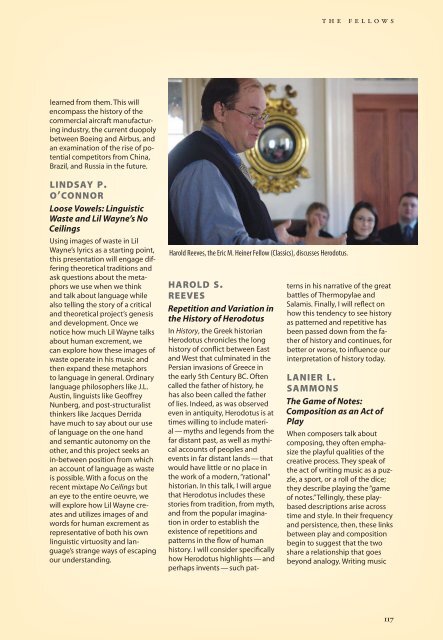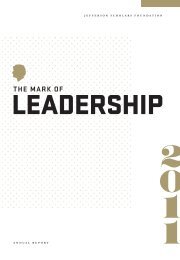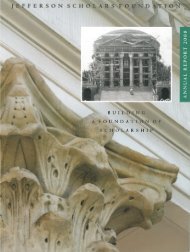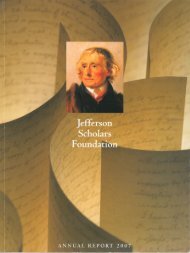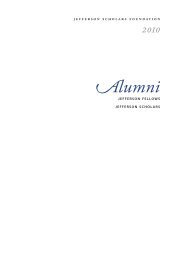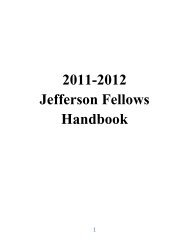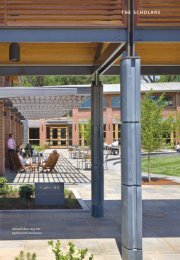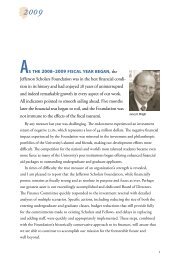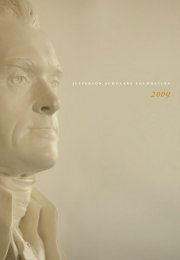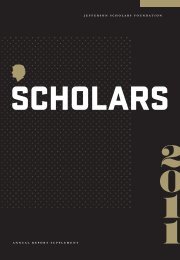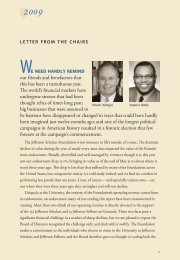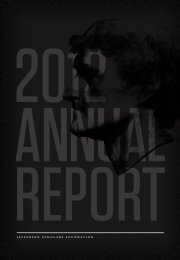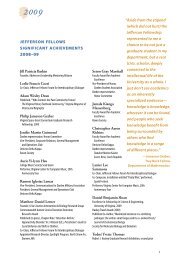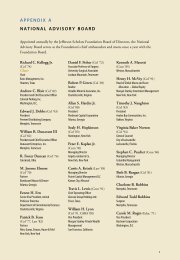THE FELLOWS - Jefferson Scholars Foundation
THE FELLOWS - Jefferson Scholars Foundation
THE FELLOWS - Jefferson Scholars Foundation
- No tags were found...
You also want an ePaper? Increase the reach of your titles
YUMPU automatically turns print PDFs into web optimized ePapers that Google loves.
the fellowslearned from them. This willencompass the history of thecommercial aircraft manufacturingindustry, the current duopolybetween Boeing and Airbus, andan examination of the rise of potentialcompetitors from China,Brazil, and Russia in the future.lindsay p.o’connorLoose Vowels: LinguisticWaste and Lil Wayne’s NoCeilingsUsing images of waste in LilWayne’s lyrics as a starting point,this presentation will engage differingtheoretical traditions andask questions about the metaphorswe use when we thinkand talk about language whilealso telling the story of a criticaland theoretical project’s genesisand development. Once wenotice how much Lil Wayne talksabout human excrement, wecan explore how these images ofwaste operate in his music andthen expand these metaphorsto language in general. Ordinarylanguage philosophers like J.L.Austin, linguists like GeoffreyNunberg, and post-structuralistthinkers like Jacques Derridahave much to say about our useof language on the one handand semantic autonomy on theother, and this project seeks anin-between position from whichan account of language as wasteis possible. With a focus on therecent mixtape No Ceilings butan eye to the entire oeuvre, wewill explore how Lil Wayne createsand utilizes images of andwords for human excrement asrepresentative of both his ownlinguistic virtuosity and language’sstrange ways of escapingour understanding.Harold Reeves, the Eric M. Heiner Fellow (Classics), discusses Herodotus.harold s.reevesRepetition and Variation inthe History of HerodotusIn History, the Greek historianHerodotus chronicles the longhistory of conflict between Eastand West that culminated in thePersian invasions of Greece inthe early 5th Century BC. Oftencalled the father of history, hehas also been called the fatherof lies. Indeed, as was observedeven in antiquity, Herodotus is attimes willing to include material— myths and legends from thefar distant past, as well as mythicalaccounts of peoples andevents in far distant lands — thatwould have little or no place inthe work of a modern, “rational”historian. In this talk, I will arguethat Herodotus includes thesestories from tradition, from myth,and from the popular imaginationin order to establish theexistence of repetitions andpatterns in the flow of humanhistory. I will consider specificallyhow Herodotus highlights — andperhaps invents — such patternsin his narrative of the greatbattles of Thermopylae andSalamis. Finally, I will reflect onhow this tendency to see historyas patterned and repetitive hasbeen passed down from the fatherof history and continues, forbetter or worse, to influence ourinterpretation of history today.lanier l.sammonsThe game of Notes:Composition as an Act ofplayWhen composers talk aboutcomposing, they often emphasizethe playful qualities of thecreative process. They speak ofthe act of writing music as a puzzle,a sport, or a roll of the dice;they describe playing the “gameof notes.” Tellingly, these playbaseddescriptions arise acrosstime and style. In their frequencyand persistence, then, these linksbetween play and compositionbegin to suggest that the twoshare a relationship that goesbeyond analogy. Writing music11


